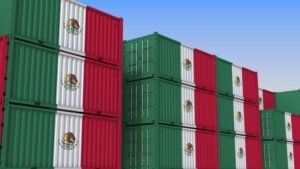International supply chains have been challenged by raw material shortages, logistics delays and reduced capacity due to COVID-19. As the global economy recovers from the shock of the pandemic, supply chains in all industries are rebuilding. Mexico is in an interesting position in the international supply chain and consolidating it could bring further economic growth, social development and technological innovation. To do so, Mexico needs to tackle certain challenges.
To improve its competitiveness, Mexico first needs to strengthen its transportation infrastructure. Beyond infrastructure and multimodal transportation, the country also needs a reliable supply of energy and water. Other challenges to tackle include cybersecurity breaches and bottlenecks and delays in ports. Likewise, Mexico has yet to improve its capital flow within the supply chain. If the circle of capital becomes more agile through the right support and incentives, the entire sector will benefit.
The COVID-19 pandemic is a reminder of the importance of human capital throughout industrial activity. Therefore, to improve competitiveness, the human factor must be prioritized. Those involved in the supply chain need a specific skill set and research capabilities that can ignite and foster innovation. Likewise, investing in talent and training of the skilled workforce is what Mexico should be doing if it wants to keep its position in the index of global players in the industry. If Mexico wants to be taken seriously in the global arena, it needs a strong commitment at the national level to train the workforce. Without talent there is no industry.
Mexico has unique opportunities for growth and is increasingly becoming more attractive in manufacturing the industry demands. However, Mexico is not known for being a technology producer country, it is known as a technology consumer country. Mexico’s condition as a technology consumer country is unlikely to change in the short term. To boost the supply chain in Mexico, investment and collaboration to produce inhouse innovation is key. The country also needs to implement strategies that allow for the fast incorporation of innovation into industrial processes and procedures.
To achieve the leap forward, Mexico needs local technological production generated through the joint efforts of the government, companies, academic institutions and research and development centers. In this scenario, the government needs to lead innovation efforts and support companies that are committed to local research and development. Meanwhile, academic institutions need to adapt quickly to form the required human talent for new technologies. In other words, México needs better collaboration between the government and the private sector to achieve a better understanding of what companies need to improve to favor national competitiveness.
In conclusion, Mexico has a privileged geographical location that allows it to position itself as a node for global commerce and supply chain distribution. It also has competitive and capable talent that can perform high-quality work and boost economic growth. However, to boost competitiveness of its national suppliers, public policies and a coordinated government strategy are essential. With a national guideline and united efforts between sectors and stakeholders, Mexico will achieve its full potential and consolidate itself as an international reference in the global supply chain.
Sources:
https://www.alixpartners.com/media/17702/mexico-supply-chain-article_vf.pdf



